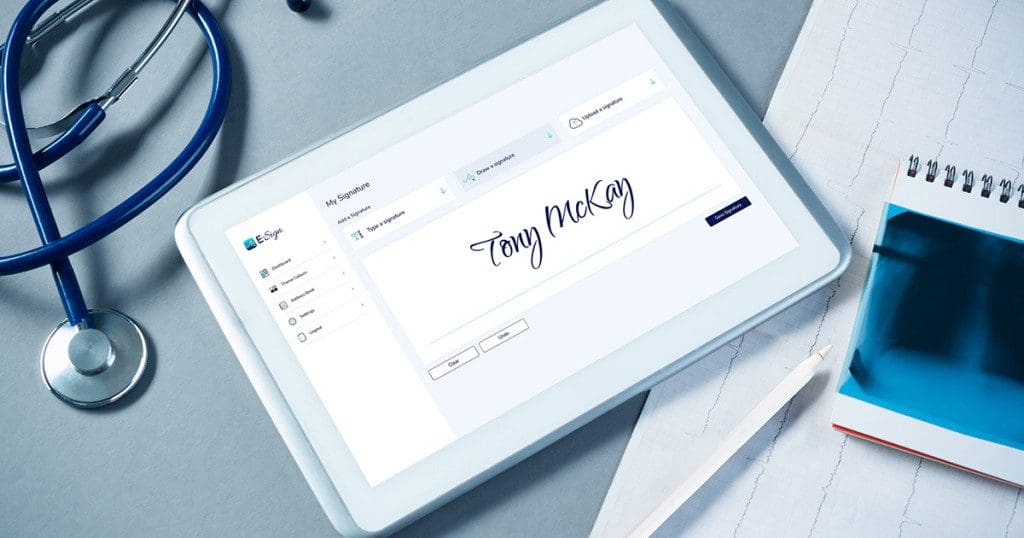Home | News and Insights | The Importance of Digital Document Management in Healthcare

Posted 19th February 2024
Digital transformation has become an integral part of many industries, and healthcare is no exception. The Digital Transformation in Healthcare market value is expected to increase to $253.6 billion by 2033, highlighting the growing adopting of new digital technologies in the industry.
Whether it’s consent forms, prescriptions, patient records, or clinical documents, it’s fair to say that healthcare professionals rely heavily on paper-based processes. How that paperwork is managed can impact all areas of the healthcare sector from the patient experience and care to employee capacity and satisfaction. Digital documents can help improve document management across the healthcare sector. This is particularly true for the NHS, who have embarked on a digital transformation journey in recent years.
In this blog, we’ll be discussing the importance of digital document management in healthcare and how electronic signatures can benefit the healthcare sector.

Poor document management can have a knock-on effect on patients and employees alike. Digital documents can support the healthcare sector on its mission to provide the best possible patient care. Let’s take a closer look at how digital documents can help the healthcare industry, whether that’s the NHS or the private sector.
Electronic signatures not only streamline paperwork for medical professionals but also for patients. From fit notes to prescriptions, digitalisation has the potential to make life significantly easier for patients. Digital prescriptions, for example, enable GPs to send prescriptions directly to the pharmacy- the patient no longer has to act as the middleman between the two providers. That is just one example of how digital documents can benefit patients. With better-organised records, healthcare professionals and administrators can provide a smoother patient experience across all areas of the healthcare sector, from GP surgeries to hospitals. With healthcare professionals spending less time on paperwork, they’re free to focus on providing the best care possible.
Healthcare professionals have a lot of paperwork to fill in. Whilst this is an important part of the healthcare sector, the administrative side can be time-consuming and take time away from direct patient care. Streamlining paperwork with digital document management enables healthcare professionals to spend more time with patients. No one trains as a doctor, nurse, or healthcare assistant to spend hours of their shift filling in paperwork. Embracing digital documents can reduce the time spent on paperwork and increase efficiency and productivity in GP surgeries and hospitals, allowing healthcare professionals to give a better quality of care to patients.
In January 2020, Matt Hancock noted that “two-thirds of all the patient data held by hospital trusts are generated and held in disorganised form, as freeform electronic documents or scanned letters or PDFs.” Digital documents have the potential to improve data organisation by eliminating the need for scanning and filing. With an entirely digital system, patient data can be centralised in one location, making it easier to search for relevant documents. Centralising patient information ensures healthcare professionals have access to a complete set of records, ensuring consistency and uniformity across the entire sector.
In 2021/2022, around £136.1 billion went into funding the NHS. It’s thought that going digital could help to save the NHS a significant amount of money. It’s estimated that digital healthcare processes could save as much as £7.5 billion. Switching from paper to digital documents could also help to reduce spending. Whilst each trust spends a different amount on MFD (Multi-functional devices i.e. printers/ scanners) and printing, paper processes generally cost the NHS hundreds of thousands of pounds each year. In 2018, The Mid Yorkshire NHS Trust spent £179,496 on paper alone; this cost could be all but eliminated if the Trust became fully digitalised with the help of digital signatures and digital documents.
Improved Audit Trial and Staff Efficiency
In addition to the quantifiable benefits, digital transformation brings qualitative improvements to healthcare processes. With electronic signatures, an improved audit log ensures that all actions are recorded, enabling better transparency, accountability, and traceability. This not only enhances compliance but also facilitates easier audits and reduces potential errors or malpractices.
Furthermore, Digitalisation enables seamless collaboration and communication among healthcare professionals. Staff members can quickly access and review electronic documents, reducing delays and ensuring continuity of care, even in cases of absence or staff rotation. This enhanced efficiency leads to improved patient care and satisfaction.
The idea of a paperless NHS has been around for a long time, however in 2023 there was a growing realisation that paper and digital records can live side by side to deliver optimal efficiencies in patient care. As the way we work moves increasingly online, healthcare providers need to be able to keep up, balancing the demand for increased digitalisation with factors like accessibility. Continuing to rely on paper processes could hamper progress and lead to varying digital maturity and disjointed patient records across individual Trusts and GPs. With developments such as the NHS APP and Electronic Patient Records, digital documents and electronic signatures will no doubt play an increasing role in supporting healthcare digitalisation.

Let’s take a look at some of the documents that could be digitised with electronic signatures:
Launched in 2013, the Electronic Prescription Service (EPS) is now used in 93% of England’s GP practices and over 67% of prescriptions are now delivered via EPS. GPs can electronically sign prescriptions and forward them to the pharmacy in just a few clicks. This not only saves time for GP’s and patients alike but also saved the NHS £136 million between 2013 to 2016 alone.
After successfully implementing electronic signatures across GP services, digital prescribing is now being rolled out across the entire NHS, including hospitals, bringing these time and money-saving benefits to NHS trusts and helping the organisation to reach its goal of going paperless by 2024.
The NHS website states that consent to treat means “a person must give permission before they receive any type of medical treatment, test or examination.” Consent forms are also commonly used in medical research and clinical trials.
In 2017, the HRA and MHRA released a joint statement, confirming that electronic signatures could be used to seek, confirm and document consent for clinical trials saying “The use of electronic signatures and authorisations is becoming increasingly common. We’ve had queries about their validity in protocols and other documents and we’d like to clarify that we accept them as an alternative to ink signatures (hra.nhs.uk).”
If you’re sick and off work for more than 7 days (during which you can self-certify), you’ll likely be required to provide your employer with a ‘fit note’ from a doctor or Allied Health Professional. The fit note confirms that you’re ‘not fit for work’ and can be used to claim Statutory Sick Pay (SSP).
Whilst some healthcare professionals still used pen and paper to write out physical sick notes for patients, they can now be electronically generated thanks to digital signatures and digital documents. GPs and Allied Health Professionals can now create a fit note, or ‘MED 3’ as it’s also known, and electronically sign the document without having to print it out first.
PGDs or Patient Group Directions are “a written instruction for the sale, supply and/or administration of medicines to groups of patients who may not be individually identified before presentation for treatment (sps.nhs.uk)”. It basically allows a specified healthcare professional/s to administer medicine without a prescription or instruction from the prescriber (for example, walk-in centres for vaccinations).
The MHRA confirmed that electronic signatures can be used to sign and authorise PGDs. They do require an advanced electronic signature, however, meaning it must follow a specific set of criteria in order to be valid.

Here at E-Sign, we understand that you have a choice of digital signature provider. Here’s why we think your healthcare organisation should choose us:
E-Sign is the only electronic signature approved for use on the PSN, the Public Service Network. That means that E-Sign meets the strict regulatory requirements and the highest security standards of the public sector.
E-Sign is trusted by the NHS and healthcare providers worldwide for a multitude of applications, from multisite practices to COVID-19 testing and vaccination rollout sites. All of which have one specific focus, improving the patient experience and driving greater efficiency.
Our electronic signatures are highly secure and fully verifiable. When you sign with E-Sign, you’ll have a digital certificate and a full audit trail supporting your transactions. Our document management platform is also secured via 256bit SSL encryption, so you know that your data is in secure hands.
We understand that your digital documents need to be user-friendly for both healthcare professionals and patients alike. With drag and drop features, our digital documents are easy to create. They’re also easy for patients to fill in and sign.
We understand that health data can be highly sensitive. E-Sign has a range of verification tools to protect your digital documents. Enable integrated ID verification with our ID checker, SMS authentication or password protection.
An organisation may apply an electronic seal on a contract before sending it out for signature in order to certify the integrity and origin of documents. With E-Sign, your healthcare organisation can add an electronic seal to your documents before you send them out for signing.
E-Sign is a leading provider of digital transaction management solutions, supplying professional services including Electronic Signatures, Web Forms, ID Checker, Verification Tools, Personalised Emails, API and Payment Processing to businesses of all sizes across the UK.
To find out more about our E-Sign solutions and how they could transform your business, get in touch with us today.